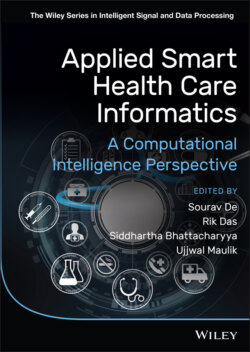Читать книгу Applied Smart Health Care Informatics - Группа авторов - Страница 16
1.3 AI in Healthcare
ОглавлениеArtificial intelligence impacts the health care domain as AI is the development of computer systems able to perform tasks that requires human intellect. Tasks such as object detection, decision making, solving complex problems, and so on are a few main benefits of artificial intelligence. AI also gives us predictions with an increased level of accuracy, it helps in decision making processes, it has solved complex problems, and it quickly performs high‐level computations that take days for a human to solve. AI is something that makes human lives easier by performing high level computations and solving complex problems.
According to the PricewaterhouseCoopers (PwC) report, artificial intelligence will contribute an additional $ 15.7 trillion to the world economy by 2030, and the greatest impact will be in the health care sector (pwc). Healthcare is getting more import and using AI in more advanced manner. The sudden importance of AI in the health care industry can be categorized into two major points. First, the high availability of medical data; many of us have tons and tons of medical data in the form of our medical history and the availability of data makes implementing artificial intelligence much easier (Bush, 2018). Second, the introduction of complex algorithms. Machine learning alone is not capable of handling high dimensionality data and medical histories are extremely high dimensional in character, there are thousands of attributes that are hard for humans to analyze and process data through machine learning. However, when neural networks and deep learning were introduced, the process become much easier. Neural networks and deep learning are focused on solving complex problems that involve high dimensionality data; their development played a significant role in the impact of AI on health care (Simon et al., 2007; Loria).
AI benefits health care organizations by implementing cognitive technology to unwind a huge amount of medical records and perform power diagnosis. For instance, Nuance is a production service provider that uses artificial intelligence and machine learning to predict the intent of a particular user. By implementing Nuance in organization system to develop a personalized user experience, a company can make better actions that enhance customer experience and overall benefit the organization. Nuance helps in the storing, collecting, and reformatting of data to provide faster and more consistent access to allow further analysis or diagnosis. These are examples of how AI is gaining attention and being helpful to the health care industry (Aronson and Rehm, 2015; Schmidt‐Erfurth et al., 2018).
